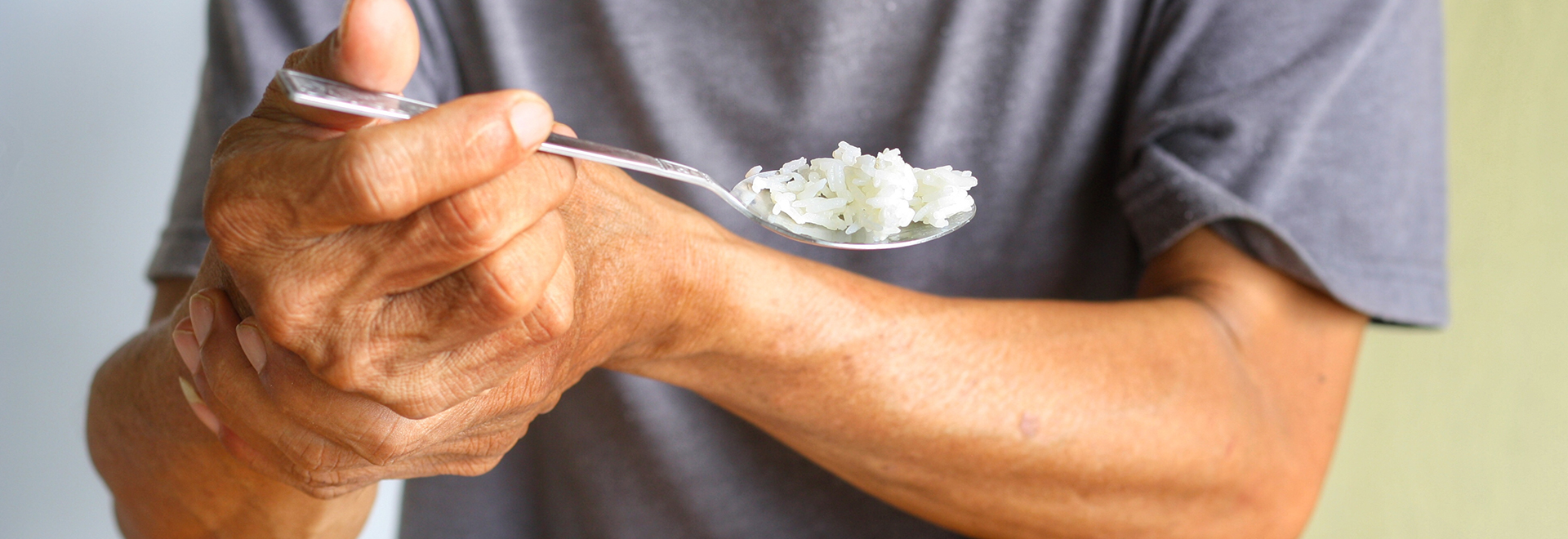One in 800 Hong Kong people in suffers from Parkinson’s disease. Parkinson’s disease is a common degenerative neurological disorder in the elderly. People usually develop the disease in their sixties.
What is Parkinson’s disease?
Parkinson's disease is a neurodegenerative disorder associated with progressive degeneration of the brain, including a structure called substantia nigra. This structure is responsible for producing dopamine, a neurotransmitter that controls body movement. When dopamine levels decrease, it causes abnormal brain activity, leading to impaired movement and other symptoms of Parkinson's disease, such as tremors and slow movement. Tremors, bradykinesia (slowed movements), rigidity, and postural instability are the four motor symptoms called parkinsonism.
Ageing leads to the degeneration of brain cells, including substantia nigra. Parkinson’s disease accelerates the rate of degeneration and deterioration of patients’ nervous systems.
The cause of Parkinson’s disease is unknown, but ageing and genes appear to play a role. Its cause can be categorised as primary and secondary, in which over 70% of cases belong to the former.
Stages of Parkinson’s Disease
There are typical patterns of progression in Parkinson’s disease that are defined in 3 stages.
In the initial stage, the person has mild symptoms that generally do not interfere with daily activities, such as shaking hands, changes in facial expression, slowed movements and handwriting problems.
Symptoms start getting worse in the middle stage, including walking problems, poor posture and loss of balance.
At the most advanced and debilitating stage, the person loses his/her independence with impaired speech, swallowing problems and incontinence due to the autonomic nervous system disorder.
The symptoms of Parkinson’s disease or parkinsonism vary among individuals. With medications, some people experience changes over 20 years or more.
Ten Early Signs Of Parkinson’s Disease
The above Parkinson’s disease symptoms are irreversible. Therefore, please pay attention to your elderly family members whether they have the following early-stage symptoms:
- Tremor
- The rigidity of limbs and joints
- Trouble moving or walking
- Loss of facial expression
- Loss of balance, easy to fall
- Stooping or hunching over
- Difficulty in handwriting or small handwriting
- A soft or low voice
- Dizziness or fainting
- Constipation
The sooner the treatment is started, the slower the deterioration of Parkinson's disease is.
Does Parkinson’s Disease equal to Dementia?
Parkinson’s disease and Dementia are two different illnesses. Parkinson disease causes physical symptoms at first. However, problems with cognitive function, including forgetfulness and trouble with concentration, may arise later.
Dementia, also known as Alzheimer’s disease, leads to memory loss, cognition problems and even personality change.
As Parkinson’s disease gets worse with time, many people develop dementia in the later stages. This can cause the aforementioned symptoms, especially for older patients.
Diagnosis of Parkinson’s Disease
No specific test exists to diagnose Parkinson's disease. Instead, your neurologist will diagnose Parkinson's disease based on your medical history, a review of your signs and symptoms, and a neurological and physical examination. Imaging tests, such as CT scans and X-rays, may also help rule out other disorders.
Treatments of Parkinson’s Disease
Parkinson's disease cannot be cured, but medications can help control the symptoms. In some cases, surgeries and physiotherapy are suggested.
- Medications: Drugs can help relieve the symptoms of tremors and stiffness of joints and improve daily living activities.
- Surgery: If medication is no longer effective, surgeons may implant electrodes into a specific part of your brain. It sends electrical pulses to your brain constantly and may reduce your Parkinson's disease symptoms. However, it involves risks and complications (possible).
- Physiotherapy: Provide training of muscles and joints, posture and gait. Teach proper transfer techniques and appropriate use of walking aids, improve patients' mobility and reduce the risk of falls.
Medications for Parkinson’s Disease and the Side-Effects:
The major purpose of antiparkinson drugs is to recover the levels of dopamine and control the symptoms. Your doctor may prescribe:
- Levodopa: The most effective medication to control the symptoms of Parkinson's disease
- Dopamine agonists: Treat early-stage Parkinson’s disease.
- Monoamine oxidase-B (MAO-B) inhibitors: Use as an alternative to levodopa to treat early-stage Parkinson’s disease.
- Catechol O-methyltransferase (COMT) inhibitors: Treat people in later stages of Parkinson’s disease.
- Antimuscarinics: Reduce tremor and rigidity but not bradykinesia.
- Amantadine: Provide short-term relief of mild, early-stage Parkinson's disease symptoms. It may also be given with carbidopa-levodopa therapy during the later stages of Parkinson's disease to control involuntary movements (dyskinesia) induced by carbidopa-levodopa.
The above medicines have certain side effects, including:
- Nausea
- Vomiting
- Lightheadedness
- Drowsiness
- Involuntary movements
- Tiredness
- Fainting
- Purple mottling of the skin
- Ankle swelling
Due to the side effects, many patients refuse to receive medications and delay their treatments, accelerating the degeneration and deterioration, as Dr Tsoi Tak Hong, the Co-Director of Neurology Centre from Hong Kong Sanatorium & Hospital, pointed out. Family support is crucial for those with Parkinson’s disease. Encouraging timely medications and treatments can help control the conditions and lower the disruption made in their everyday life.

